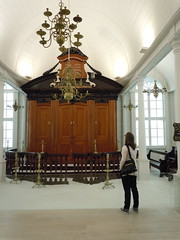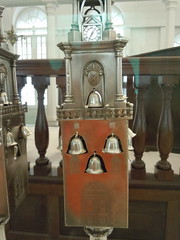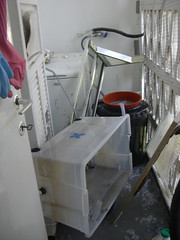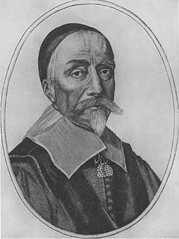Masoret מסורת
Just some drivel from a PhD student in 17th century English literature. Masoret is Hebrew for tradition; Masor is also the Hebrew word for saw. Since i hope to be learning and blogging about traditional woodworking (amongst sundry other things), i thought it was an apt play on words. Before you ask, yes, i have a glamorous social life.
Sunday, 26 December 2010
James I, Sport, and Unity
Tuesday, 30 November 2010
Westerkerk Rimonim (Finials)
 The Israel Museum just underwent a $100 million renovation. One of the highlights of the visit i took with my mum was the Tzedek VeShalom Synagogue, built in 1734 in Paramaribo, Suriname. For the woodworkers out there, the ark is made of Cyprus wood and mahogany. Below is a video about the synagogue and some really cool footage of the restoration. Just some brief history of the settlement of Jews in the area. According to our tour guide, in 1630, about 500 Jews came to Suriname to establish sugar plantations. They named them after cities in the land of Israel: Hebron, Tiberias, Jerusalem, Beersheba, to name a few of the plantations that existed in Suriname. The name of the Jewish settlement was actually the Jodensavanne, or the Jewish Savannah. To read more about the Jewish community in Suriname, click here.
The Israel Museum just underwent a $100 million renovation. One of the highlights of the visit i took with my mum was the Tzedek VeShalom Synagogue, built in 1734 in Paramaribo, Suriname. For the woodworkers out there, the ark is made of Cyprus wood and mahogany. Below is a video about the synagogue and some really cool footage of the restoration. Just some brief history of the settlement of Jews in the area. According to our tour guide, in 1630, about 500 Jews came to Suriname to establish sugar plantations. They named them after cities in the land of Israel: Hebron, Tiberias, Jerusalem, Beersheba, to name a few of the plantations that existed in Suriname. The name of the Jewish settlement was actually the Jodensavanne, or the Jewish Savannah. To read more about the Jewish community in Suriname, click here.
 In addition to paying homage to their biblical roots, the Jews of Suriname paid tribute to their Spanish-Portugese Dutch roots. Whilst having a peek around the synagogue, we noticed that one of the finials for the Torah scrolls was an unmistakable nod to the Westerkerk in Amsterdam. You know--the one that Anne Frank mentions? Pretty cool, eh? How many synagogues today would commission, let alone tolerate, a Torah adornment in the style of a church? Pretty remarkable...
In addition to paying homage to their biblical roots, the Jews of Suriname paid tribute to their Spanish-Portugese Dutch roots. Whilst having a peek around the synagogue, we noticed that one of the finials for the Torah scrolls was an unmistakable nod to the Westerkerk in Amsterdam. You know--the one that Anne Frank mentions? Pretty cool, eh? How many synagogues today would commission, let alone tolerate, a Torah adornment in the style of a church? Pretty remarkable...Thursday, 29 July 2010
Grey Water Fail
 pump to get the water from the holding tank (bin--let's be honest) to the outfeed tank (that giant plastic box on a shelf), sometimes, the water overflows a bit. I usually catch it and it's ok. Today that happened. I caught it, and thankfully left the area, only to hear about 60 litres of water come crashing down with the shelf that was holding it. My floor was flooded, and only as i stood ankle deep trying to open the drain holes to release the water did i become aware that the pump's extension cord and power bar were partially submerged. Everything is (mostly) under control now. So it's back to the drawing board.
pump to get the water from the holding tank (bin--let's be honest) to the outfeed tank (that giant plastic box on a shelf), sometimes, the water overflows a bit. I usually catch it and it's ok. Today that happened. I caught it, and thankfully left the area, only to hear about 60 litres of water come crashing down with the shelf that was holding it. My floor was flooded, and only as i stood ankle deep trying to open the drain holes to release the water did i become aware that the pump's extension cord and power bar were partially submerged. Everything is (mostly) under control now. So it's back to the drawing board.Thursday, 22 July 2010
Coopers Versus Joyners
Sunday, 11 July 2010
Revius and Donne: Poets of the Bible
 In the past, we have noted the parallel developments in biblical scholarship and politics in the Netherlands and England (link), specifically the Authorised Version and the Statenvertaling. We have also noted the influence of Hugo De Groot (Grotius) on John Milton. Recently, i came across a poem by Jakob Reefsen (Jacobus Revius), a Hebrew scholar who worked on the Statenvertaling and who also composed religious as well as secular poetry. It reminded me of a poem by Donne, and, when taken together, there are some similarities, but overall, Revius' seems like a lesson in how not to write poetry. But i'll let you decide for yourself:
In the past, we have noted the parallel developments in biblical scholarship and politics in the Netherlands and England (link), specifically the Authorised Version and the Statenvertaling. We have also noted the influence of Hugo De Groot (Grotius) on John Milton. Recently, i came across a poem by Jakob Reefsen (Jacobus Revius), a Hebrew scholar who worked on the Statenvertaling and who also composed religious as well as secular poetry. It reminded me of a poem by Donne, and, when taken together, there are some similarities, but overall, Revius' seems like a lesson in how not to write poetry. But i'll let you decide for yourself:
'Hy Droegh Onse Smerten' (1630 in Over-Ysselsche Sangen en Dichten)
T'en sijn de Joden niet, Heer Jesu, die u cruysten,
Noch die verradelijck u togen voort gericht,
Noch die versmadelijck u spogen int gesicht,
Noch die u knevelden, en stieten u vol puysten,T'en sijn de crijghs-luy niet die met haer felle vuysten
Den rietstock hebben of den hamer opgelicht,
Of het vervloecte hout op Golgotha gesticht,
Of over uwen rock tsaem dobbelden en tuyschten:Ick bent, ô Heer, ick bent die u dit hebt gedaen,
Ick ben den swaren boom die u had overlaen,
Ick ben de taeye streng daermee ghy ginct gebonden,De nagel, en de speer, de geessel die u sloech,
De bloet-bedropen croon die uwen schedel droech:
Want dit is al geschiet, eylaes! om mijne sonden.
In English ( i grabbed the translation here):
He carried our sorrows. It is not the Jews
alone, Lord Jesus, that had you crucified;
betraying you, dragging you to the court,
hating your guts, spitting in your face,
binding you, tattooing you with bruises.
Nor only the soldiers
who with their ready fists
raised the reed, lifted the hammer high,
fixed the cursed wood at the place of the skull
and squabbled, dicing for your coat.
It's me, my God, me who did this to you.
I am the heavy tree that bore you down,
the cord that cut you mercilessly. Me.
The nail and spear. The whip they slashed you with.
The crown of blood you wore upon your brow.
Oh, all this happened on account of my own sin.
And here is of course Donne's Holy Sonnet XI (written 1609-1611?):
Spit in my face, you Jews, and pierce my side,
Buffet, and scoff, scourge, and crucify me,
For I have sinn'd, and sinne', and only He,
Who could do no iniquity, hath died.
But by my death can not be satisfied
My sins, which pass the Jews' impiety.
They kill'd once an inglorious man, but I
Crucify him daily, being now glorified.
O let me then His strange love still admire ;
Kings pardon, but He bore our punishment ;
And Jacob came clothed in vile harsh attire,
But to supplant, and with gainful intent ;
God clothed Himself in vile man's flesh, that so
He might be weak enough to suffer woe.